Search
Showing 10 of 1702 results for the cuzzy rolly, latest
-
PIF Recipient: Chasing Time English
Across the world, there is a vast market for English language learning. To put a number on it – around one billion learners. In many countries, though, English is taught through repetitive, mostly grammar-based content. The result is two-fold: students become disengaged and disinterested, and they advance in writing and reading skills at the expense of speaking skills.
Chasing Time English is a New Zealand company on a mission to make English language learning engaging, exciting, and effective for educators and students around the world. How? Through video. The team at Chasing Time English believe that English language classes should excite and inspire students to learn more, and decided video was the best medium to achieve this.

Chasing Time English uses engaging video story content to educate learners.
Through original, live-action-drama videos, Chasing Time English brings intrigue, humour, surprise and suspense into learning. Redrawing the line between education and entertainment, the short videos produced by Chasing Time English are designed to stand alone as quality entertainment, with strong learning outcomes embedded throughout.
To achieve this feat, the company brings together a team of English language educators, applied linguists and filmmaking professionals, who collaborate to create compelling, narrative-based drama content backed up by a cutting-edge pedagogy.
While other education publishers also produce English language learning video content, this is often lower quality video with limited learner appeal and retention. By creating professional quality drama content, Chasing Time English has become a market leader in English language video learning. Captivate learners, and the learning will follow.
Chasing Time English is one of the successful recipients of funding from the International Education Product Innovation Fund, a New Zealand Government-funded initiative to support pilot projects that reimagine and rethink what a New Zealand education experience can look like and mean for global learners. Education New Zealand Manapou ki te Ao (ENZ) is the government agency responsible for international education and is managing the Product Innovation Fund.
ENZ will work in a partnership approach with each successful recipient, sharing skills, expertise and resources to help each pilot succeed and develop into a self-sustaining education offering. The lessons learned through the pilot projects will be shared for the benefit of New Zealand’s entire international education sector, with a view to encouraging innovative, new offerings for international learners to experience a New Zealand education.
The Product Innovation Fund award will enable Chasing Time English to design, develop and deliver a new set of programmes for high beginner to elementary English language learners and educators. Target audiences include New Zealand education institutions with offshore partners, high schools in Japan and the Netherlands, and English language teachers at the post-beginner level.
Across two programmes of 10 weeks each, learners will be able to access up to 100 hours of engaging resources, including Chasing Time English’s distinctive video content, along with other audio and video resources and communication-based activities. The new set of programmes will incorporate a strong New Zealand theme, sharing New Zealand storytelling and themes of environmental sustainability and innovation. The original video content will also showcase New Zealand’s spectacular natural scenery, helping inspire learners and build a connection with New Zealand, wherever they are in the world.
With the support of ENZ through the Product Innovation Fund, Chasing Time English is set to continue growing its impressive offering for English language learners around the world. Already setting the bar for the quality of its learning resources and pedagogy, this Kiwi education provider is showing that online learning can be fun and effective, while also showcasing New Zealand’s landscapes, people and values to learners wherever they are.
More information:
-
PIF Recipient: Connect2NZ
Connect2NZ aims to show that tertiary education providers can work with government agencies to build a framework for international learners that is innovative, future focused, and learner-centric.
Connect2NZ’s target audience is professionals, living outside New Zealand, who are seeking skills development in emerging sectors. Work has been undertaken to determine learner needs and match those with areas where New Zealand is strong. The project will design and deliver micro-learning and short courses which have pathways, allowing these learners to study from a group of courses to achieve their desired career outcomes. Potential topics include technology, leadership, health and wellness, food and agritech, energy, tourism, design and natural hazards. Our goal is to eventually extend our offerings to degree qualifications.
"What excites me the most about the Connect2NZ project is the exploration of potential new offshore/online markets. In particular, the global lifelong learner market which is huge and to date not well served by some of the fantastic educational offerings available from the New Zealand Higher Education sector, "
Professor Mick Grimley, Dean of Future Learning and Development, University of Canterbury
Some of these courses will be delivered by one provider partner, while others will be jointly designed and delivered. The number of tertiary education providers is expected to grow following consultation with government agencies and community outreach.
The pilot project is supported by Education New Zealand Manapou ki te Ao (ENZ). Through its International Education Product Innovation Fund, ENZ is supporting a range of pilot projects that reimagine how a New Zealand education can engage and inspire international learners and create impact through new delivery modes, approaches and partnerships.
"Connect2NZ breaks the mold by uniting our organizational strengths in solving a challenging problem. When we prove success, the value add is a model other institutions can follow".
Dr David Dannenberg, Director of Learning, Teaching and Library, Lincoln University.
-
PIF Recipient: Mission New Zealand
With support from Education New Zealand Manapou ki te Ao, New Zealand’s government agency for international education, Mission New Zealand showcases courses from a number of New Zealand institutes, and is being developed by The Mind Lab.
Mission New Zealand offers a fully immersive and distinctly New Zealand experience. It focuses on the best of what New Zealand has to offer and the benefits of being part of a global movement for positive change.
From anywhere in the world, learners can choose from a mix of short courses and micro-credentials, grouped around four themes that reflect New Zealand’s progressiveness and values: culture, tech innovation, creativity and sustainability. Courses range from one to 15 weeks in length, with a mix of free and paid options available.
A selection of The Mind Lab’s own micro-credentials is available on Mission New Zealand, along with offerings from Te Pūkenga - New Zealand Institute of Skills and Technology - and some of New Zealand’s most innovative private training establishments.
Visitors to the site will be greeted by the world’s first 360° virtual pōwhiri, starting at the gates of Ngāti Whātua Orākei Marae in Auckland. They will experience being called onto the marae with a karanga and stepping onto the grounds to be welcomed by members of Ngāti Whātua.
Personalised learning, with optional content and stories, insights and other material will help learners experience what makes New Zealand unique.
Through an immersive experience, Mission New Zealand invites learners to take the first step in a lifelong connection with Aotearoa New Zealand.
The new platform is designed to address the increasing global demand for connections with purpose and cause, for online learning options, and for shorter and more flexible courses.
Mission New Zealand is among a range of pilot projects supported by Education New Zealand's Manapou ki te Ao Covid Response and Recovery Fund product and service diversification workstream. This New Zealand Government-funded initiative encourages the development of new products and services in the international education sector.
The Mind Lab was founded in 2013 and has a strong background in innovation, online education delivery that builds impactful futures and building community connections, including relationships with iwi and Māori-led organisations.
More information:
-
PIF Recipient: Te Kaihau Ltd
Te Kaihau Ltd, based in the Hutt Valley, is the organisation behind the Global Enterprise Experience (GEE), a well-known social enterprise proposal competition. For years, GEE has brought together eight-person virtual teams from around the world. Their challenge: to work together on a six-page business case for a profitable, self-funding business venture that addresses a United Nations (UN) Sustainable Development Goal (SDG) and can get off the ground with limited capital.
In 2022 alone, GEE placed 1,100 participants from 131 universities and 98 other organisations across 72 countries onto global teams. Although many participants are tertiary students studying business or other courses, GEE teams are open to anyone, anywhere in the world, looking for a cross-cultural challenge.
From a highly successful foundation, Te Kaihau Ltd is planning to upgrade the Global Enterprise Experience into an even more impactful programme that builds lifelong links between Kiwis and emerging global learners, while making a real contribution to sustainable development. Thanks to an award of funding from the International Education Product Innovation Fund, managed by Education New Zealand Manapou ki te Ao (ENZ), the upgraded GEE programme is on the way to becoming a reality.
The new ‘GEE Peer-Leader Plus’ programme is designed to supercharge the impact of the existing programme, which already develops an impressive set of skills in its participants: cross-cultural communication, teamwork, entrepreneurship and innovation to name a few.
Future GEE learners who opt into GEE Peer-Leader Plus will benefit from one-on-one leadership coaching, peer-group interactive webinars, online learning modules, and a microcredential in peer-leadership which will be assessed on performance.
As Te Kaihau Ltd explains, the upgraded programme aims to transform learners into peer-leaders. Instead of being passive recipients of knowledge, peer-leaders step up to make a difference where they can, no matter their ‘designated role’ in a workplace or other organisation. Peer-leaders are confident, can influence others, are action oriented, and can support designated leaders to make change.
A deeper, more immersive learning experience through the GEE Peer-Leader Plus programme will also leave learners in a better position to bring their sustainable business concept to life, or take other meaningful action on the UN SDGs.
Woven throughout the new learning experience is a uniquely New Zealand theme, which draws attention to New Zealand’s efforts on sustainable development and positions New Zealand as a leader in ‘manaaki leadership’, which uplifts and supports the mana of others.
To complement the upgraded GEE experience, a microcredential will be developed and offered to universities and other education providers. A microcredential – a short course that offers certification on completion – recognises achievement in a specific set of skills, competencies, and knowledge. The GEE Peer-Leader Plus microcredential will provide a way for education providers to incorporate peer-leadership into their international-focussed course offerings.
Over time, and using the GEE Peer-Leader Plus microcredential as a stepping stone, Te Kaihau Ltd hopes to build a full qualification in global leadership and innovation by 2025, with the GEE Peer-Leader Plus experience serving as one module. With GEE participants coming from 800 universities around the world, Te Kaihau Ltd has built a valuable network of learners and education providers. Now, with support from ENZ and the International Education Product Innovation Fund, the stage is set for the New Zealand-led GEE programme to supercharge its impacts, building peer-leaders around the world with the skills and capability to take action for a better future.
More information:
-
PIF Recipient: Te Whare Wānanga o Awanuiārangi
Te Whare Wānanga o Awanuiārangi is one of New Zealand’s three wānanga - publicly owned tertiary institutions which provide education in a uniquely Māori cultural context. Awanuiārangi has been engaging internationally for over a decade, delivering postgraduate programmes to Indigenous communities in Washington State and Hawaii, and establishing networks and alliances with Indigenous communities and education providers across the United States.
Now, a new project led by Awanuiārangi is set to accelerate Indigenous education outcomes globally and build on New Zealand’s position as a global leader in postgraduate Indigenous education. ‘Iwi taketake’ (Indigenous people) is a project that will see the development of an international Indigenous curriculum for postgraduate study, covering master’s degrees, postgraduate certificates and diplomas, through to doctoral qualifications.
The target audience for the programme is Indigenous college graduates based at Hawai’i, Washington State, Canada and Australia, with Indigenous college graduates and tribal communities across the United States also in focus. A key objective of the new model is to design an education offering that fits the learner, rather than requiring learners to fit the programme.
Awanuiārangi will take its model of working with local hapū, iwi and their representative organisations in Aotearoa to the four focus areas in the Unites States, where it has already established networks. Iwi taketake will be the result of a co-construction process with Indigenous organisations and potential scholars, with an in-person wānanga (symposium) taking place at each delivery site in the United States.
After the curriculum is developed, endorsed and approved by key stakeholders, Awanuiārangi aims to run Iwi taketake for its first cohort of scholars in 2024, through a blended mix of in-person and online learning across the four sites. The programmes that form the Iwi taketake curriculum may be co-badged - awarded jointly by Te Whare Wānanga o Awanuiārangi and partners offshore, such as the University of Washington Tacoma and the University of Hawai’i Maui College.
Awanuiārangi’s model will affirm the notion that postgraduate education can provide Indigenous scholars with pathways for purpose-led careers that benefit people, place and planet. The subject areas and kaupapa (initiatives) covered by the curriculum will be delivered in a culturally safe environment, respecting Indigenous research ethics and methodologies. Scholars will draw learning directly from their own communities with the support of Awanuiārangi and their local delivery partners, ensuring that programmes are highly relevant to learners’ cultural and social contexts.
The collaborative, co-constructed programme will also serve to strengthen Indigenous links and alliances between New Zealand and the United States more generally, and open further opportunities for collaboration and improving educational success in postgraduate study.
Iwi taketake is one of the initiatives supported by the International Education Product Innovation Fund, a New Zealand Government-funded initiative to reimagine what a New Zealand education can look like and mean for global learners. Education New Zealand Manapou ki te Ao is New Zealand’s government agency dedicated to international education, and is the kaitiaki (guardian) of the Product Innovation Fund.
The Fund is supporting a range of pilot projects that develop and test new education products and services for global learners. Awanuiārangi’s pilot project explores how New Zealand’s strengths in Indigenous education can be delivered to international learners, tailored to Indigenous communities in other countries, and delivered in a blended medium, while uplifting all parties and helping strengthen Indigenous connections and cooperation across the Pacific.
More information:
Learn more about Te Whare Wānanga o Awanuiārangi
*Image at top of page: TWWoA's Professor Mera Penehira with Big Island of Hawaii cohort of doctoral students: Katie Benioni, Nancy Levenson, Noekeonaona Kirby and Taffi Wise.
-
PIF Recipient: Virtual Medical Coaching
In the United States alone, approximately 800 women die each year during pregnancy and within 42 days after delivery. More than 60% of those deaths are believed to be preventable. In developing countries, the rate of pregnancy-related deaths is up to 300 times higher.
An important part of the solution is education. Globally, midwives are in high demand, with the UK’s NHS increasing their places for student midwives by 3000, starting this year. Australia is also planning to increase numbers, while in New Zealand, a funding boost will increase the number of Māori and Pacific students training in midwifery.
While the demand for midwifery training is growing, education offerings haven’t kept up. Childbirth is deeply personal, and feedback from mothers – validated by hospital staff – is that they do not wish to have extra staff or students in the room for training. With no effective opportunities for face-to-face learning, there is a global need for a realistic and scalable childbirth simulation.
That’s where Virtual Medical Coaching’s vision comes in, supported as a recipient of the International Education Product Innovation Fund. Virtual reality (VR) software will provide a safe and controlled environment for students to see and assist in childbirth simulations, both with and without complications and in a range of different scenarios. As the student improves, the simulations they encounter increase in difficulty. A machine-learning algorithm enables fast and accurate feedback to both the learner and any tutors.
The simulation will be interactive and responsive, meaning that any action taken by a student creates a life-like consequence and reaction. The outcome is that learners are taught to effectively make decisions and problem solve.
Existing options for midwifery training include a physical mannequin simulator, but this can be prohibitively expensive, out of reach of many training providers, and doesn’t offer students maximum learning hours. In addition, existing options don’t include the ability to witness mechanisms like rotations/restitutions or the ability to have back and forth conversations. By contrast, the VR simulation will be available to students wherever they are, and whenever they need to practice. The nature of the VR experience means that modern learning styles, such as asynchronous and remote learning, are well catered for.
With support from the International Education Product Innovation Fund, Virtual Medical Coaching’s childbirth simulation is on track to become fully released by the end of 2024. A beta-version is already used by some educators globally. The Product Innovation Fund is a New Zealand Government-funded initiative to reimagine what a New Zealand education can look like and mean for global learners.
Managed by Education New Zealand Manapou ki te Ao (ENZ), New Zealand’s government agency for international education, the fund is supporting a range of pilot projects from existing and emerging New Zealand education providers. Together, the projects rethink how an education experience from New Zealand can be delivered, and create impact, for global learners.
For Virtual Medical Coaching, it’s about finding a better solution to a serious issue. Like many other innovative Kiwi education technology companies, Virtual Medical Coaching is designing technology that will create positive impact around the world. It’s already successfully developed an x-ray simulation for healthcare professionals which has won multiple national and international awards. Now, with the support of ENZ through the International Education Product Innovation Fund, Virtual Medical Coaching is set to respond to a clear need for better midwifery training options and develop another cutting-edge learning product for both New Zealand and offshore markets.
More information:
-
Statement from Linda Sissons, Acting Chief Executive
We are deeply saddened by the tragic passing of international students in a road accident near Lake Tekapo on Saturday.
Our thoughts and prayers are with the families of the victims, the campus communities at the University of Canterbury and Victoria University of Wellington and the wider Malaysian student community in New Zealand.
We hope those injured in the crash make a full recovery.
We are grateful for the community of support that has emerged around the accident in New Zealand and Malaysia to aid the victims and their families during an extremely distressing and challenging time – heartfelt thanks to our emergency response teams, the Malaysian community in Ōtautahi Christchurch, universities, and locals who responded to the scene.
Linda Sissons
Acting Chief Executive, Education New Zealand
-
ENZ responds to international education commentary on NBR
ENZ Acting Chief Executive Dr Linda Sissons rebuts an economics commentary published on National Business Review (NBR) on Monday 25 March 2024. The rebuttal is published here on NBR and is reproduced below.
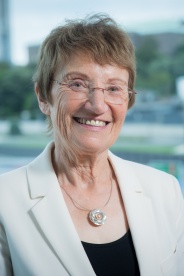 In response to your piece “International education: wrong horse to back for export growth?” my answer to the question is a hard “no”. Here’s why.
In response to your piece “International education: wrong horse to back for export growth?” my answer to the question is a hard “no”. Here’s why. Students are returning to New Zealand. In the first eight months of 2023 international student enrolments topped 59,000 with all sectors experiencing growth except wānanga. Accepting that it is from a low base, comparing 2023 to 2022, Universities have bounced back strongly reporting a 15% increase from 24,040 to 27,535.
It is true that we have not yet returned to 2019 numbers. In my opinion, this is not a bad thing. During the pandemic years the sector lost people and capability. The recent moves of some of our competitors tell you what a sudden return to those numbers of students brings.
I want to address your correspondent’s concerns about the lack of a plan and competition within amongst universities. There is a plan. The New Zealand International Education Strategy, revised in 2022 in discussion with the sector and across Government, sets out the plan to develop a high-value, resilient and innovative education sector for both international and domestic students.
I can also assure you that the sector is working together to achieve its goals, that all eight universities participated in a recent ENZ-led delegation to India, is just one example of the co-operation.
International education is more than universities. In the first eight months of 2023 English Language Schools saw the greatest percentage increase in international enrolments, increasing by 347% from 1,565 to 7,001. Schools reported a 114% increase from 5,925 to 12,662. NZIST Te Pūkenga, a 32% increase from 4,955 to 6,560 and Private Training Establishments (funded and unfunded), a 13% increase from 5,000 to 5,671.
Immigration New Zealand tell us that international student visa applications for all forms of study have increased by about 20 per cent in the peak application period. Between 1 October 2023 and 8 March 2024, they received over 31,800 applications for an international student visa.
Today we have a base of international students in the country and the pipeline for the coming academic year has strong growth.
Our own research shows that the experience international students have while studying in New Zealand is a good one. In our Student Experience survey of 4,755 international students from more than 70 nationalities, 84 percent rated their overall experience positively, while another 83 percent said they would recommend New Zealand as a study destination.
When these students return to their home, and 75% of international students return home after three years, they will be our word-of-mouth advocates – an advocacy we didn’t have during the COVID years.
New Zealanders also appreciate the benefits of international students. In an ENZ survey of 1,100 New Zealanders conducted in December last year, 75 percent of respondents believe that international students benefit New Zealand. The Ipsos Fast Facts survey, which drew responses from all regions of the country, saw 80 percent of respondents highlighting economic benefits, particularly in local communities, as a key reason for their positive view.
The results of the 2023 survey highlighted the continuing growth in support for international students and their positive impact on New Zealand since 2016 when only 57 percent believed international students helped the New Zealand economy and economic growth.
We have students in New Zealand; a strong pipeline; students having a positive experience and advocating for New Zealand; and New Zealanders appreciating the benefits having of them in our communities.
International education is highly competitive. Your correspondent rightly recognises that there are new competitors emerging and Singapore is a good example. We’ve also seen countries like South Korea, a core market for New Zealand, become competitors.
This is not new. We have, and will always have, to compete to attract international students to New Zealand – that they are returning tells me our reputation is good and we remain an attractive option.
Globally the number of international students has grown significantly over the past two decades from around two million in 1998 to over 6.4 million in 2020, according to UNESCO data. New Zealand only needs a very small proportion of what is effectively a supply-driven market to return to pre-pandemic levels of economic contribution and value.
While I am confident that international education is not the “wrong horse”, achieving double the export earnings is going to require a lot of hard work and there is much to do. My point is, that in less than two years since the borders reopened in August 2022, the recovery has well and truly commenced, the progress made to date is significant, and as a sector we can be rightly proud of what we have achieved together.
Linda Sissons
Acting Chief Executive, Education New Zealand
-
We want to hear from you!
This survey is important to gauge ENZ’s performance and importantly, let us know how we’re doing, what services you value and what you’d like to see more of.
In last year’s survey, you highlighted several themes that we’ve been working to address. We heard that you need more advance notice of our global events to allow you to plan better. In response, we published our event calendar in November, covering events to be held in the last half of 2024.
You also said you wanted to see closer alignment between government agencies and the sector. As a result, we have worked with peak bodies and key government agencies to refresh the purpose of the quarterly Peak Body Forum and built a closer working relationship with the Alliance of Peak Bodies.
Other important themes included improving our engagement and integrating views of the sector in our planning, while providing more clarity on our range of services and support. We have provided more webinars ranging from showcasing the regions to the global agent network, through to leveraging research, data and analysis to provide you with targeted market insights.
Peak body and sector representatives were involved early in our business planning, including market prioritisation, to ensure that we walk in step with the sector.
While we may not always get it right, you can rest assured that we are listening and continually striving to deliver the products and services that you value and help you to grow.
A survey link will be sent out in early May. We look forward to hearing your thoughts to enable us to improve our support to the New Zealand international education sector. Thank you in advance for your participation.
-
Growing offshore interest in NZ through onshore ‘Famils’
‘Famil’, short for ‘Familiarisation’, are visits organised to literally familiarise invited groups of people with a product, or in our case, New Zealand as an international education destination. The intended purpose is that those who attend famils will become valuable advocates for a New Zealand education and therefore drive preference for New Zealand in market.
During Covid-19 these visits were stopped due to border closures. Now that borders have been fully open for some time and our international education sector is recovering, this summer provided the perfect opportunity to show off New Zealand, including our regions and unique culture, and the wide range of educational and experiential offerings to representatives from various international markets.
The summer of showcasing New Zealand started in November with two media famil groups from India and Viet Nam. This was followed by three groups of education agents from Brazil, Germany and South Korea visiting in March and most recently, a famil co-hosted by ENZ and Air NZ bringing Japanese school teachers to regions in the North Island. ENZ subsidises these programmes with other costs covered by participants, regional economic development agencies, and education providers.
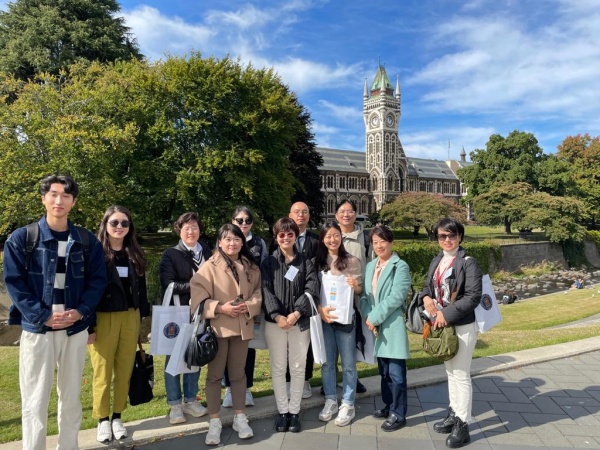
The University of Otago provided a campus tour with a Korean student and didn't miss the opportunity for a classic picture with its famous Clock Tower.
ENZ’s General Manager International, Lisa Futschek said that careful planning goes into facilitating these visits to ensure the famil groups are exposed to a range of subsectors that are relevant to the visiting country while also leveraging the visits to benefit as many providers as possible.
“While we’d love to showcase every New Zealand provider, this is obviously not possible. Much consideration is given to the source market and to the subsectors that we know are popular with that country.
“This ensures we are targeted in our approach and our visitors go back to their countries equipped with the most relevant information that helps build that pipeline of future students," said Lisa.
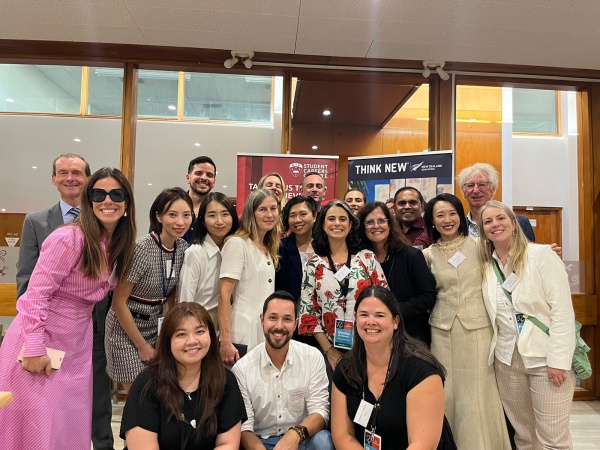
The Brazilian agents attended a networking event hosted by AIS for Auckland-based English Language providers.
“We also look for opportunities in which we can make introductions to several providers in one go. For example, a networking function was held at Auckland Institute of Studies (AIS) with Auckland-based English Language Schools invited to meet the agents from Brazil, cultivating many new connections while strengthening existing ones,” added Lisa.
As well as showcasing the various subsectors, promoting the destination is also hugely important and famil itineraries also include time spent seeing what the regions have to offer international students. This is often organised with the help of the regional economic development agencies.
A perfect example of cross sector collaboration was seen in Ōtautahi Christchurch where Christchurch Educated, an international education organisation based in the region, hosted a networking dinner with the regional economic development agency, ChristchurchNZ. They hosted the Brazilian and German agent famil groups and education providers from various sectors in the Canterbury region.
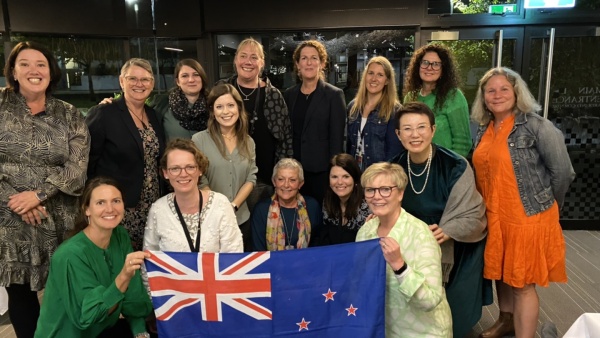
The German agents are pictured here at the Christchurch Educated networking event with a group of Christchurch based education providers (mainly high schools). The event was hosted at Ara’s Visions on campus restaurant with the Brazilian agents in attendance too.
Stefi Porter, International Education Partnership Manager for Christchurch Educated said that bringing everyone together to mutually share the benefits of studying in Ōtautahi Christchurch was a wonderful thing.
“There is certainly strength in numbers and a perfect example of where collaboration between providers and regional economic development agencies can really deliver greater bang.
“Instead of competing against one another, we are sharing resources, time and energy to show the best of our region and the breadth of study options we can offer international students.”
A key outcome of the various famil groups visiting New Zealand is that they become advocates for New Zealand as a place to study, ensuring a steady pipeline of students for years to come. In the post-famil survey, all attendees reported they were either much more likely (87.5%) or somewhat more likely (12.5%) to recommend New Zealand as a place to study for prospective students.
Other positive outcomes, include the positive media articles and social media posts produced by visiting journalists and individuals to their networks in their home countries. This positive coverage not only showcases the quality of New Zealand's education system but also shares the New Zealand education experience with prospective students in their home countries through stories featuring students and alumni.
The India media famil has achieved five in-depth stories to date in Education Times, India's largest newspaper supplement (circulation 500,000). The stories showcase the research prowess at New Zealand universities, including in biotechnology, managing climate change related disruptions, and feature the New Zealand education experiences of a range of students from India.
In Viet Nam 10 articles and four social media posts have been published so far, reaching an audience of 557,000, with more coverage expected in the coming months. Of note is HHT, the top teen magazine in Viet Nam has created a column “letters to New Zealand”, which shares weekly articles about New Zealand written about alumni.
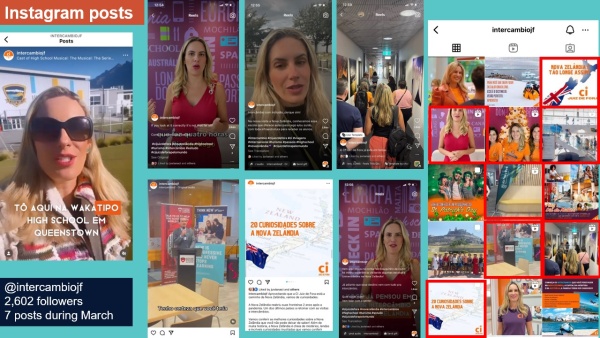
An example of some of the coverage these visits receive. Featured is a compilation of posts that Brazilian agent, Juliana Viana Silveira, owner of CI Intercambio in Juiz de Fora, made on Instagram to her followers during March while in New Zealand. The role of agents in Brazil in international student recruitment is becoming increasingly more important as reported by StudyTravelNetwork here -https://studytravel.network/magazine/news/0/30492
ENZ would like to extend a huge thanks to the education providers and regional representatives for hosting our international visitors and leaving them with a strong sense of New Zealand’s education offerings. The way in which ENZ is able to work collectively with providers and the regional economic development agencies to collaboratively plan the famil is ideal to ensure a good mix of experiences and a balance of activities. This approach helps regions feature strongly in any future famil plans and also helps develop the regional international education ecosystem.
We look forward to hearing about more connections with education representatives at the ICEF ANZA conference in Christchurch.
Check out our image gallery of the famils which shares further details of each of the groups including who attended, where they went and who they met with.
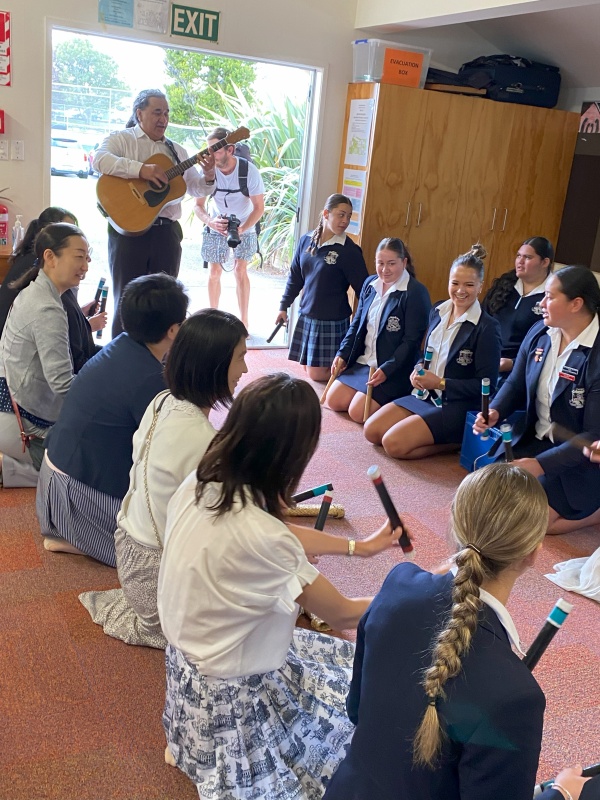
The Japanese All Girls School Teachers participated in a kapa haka class at New Plymouth Girls High School in New Plymouth. Here they are pictured playing the Tītī tōrea Māori Stick game, a traditional New Zealand game which has been played for generations.

